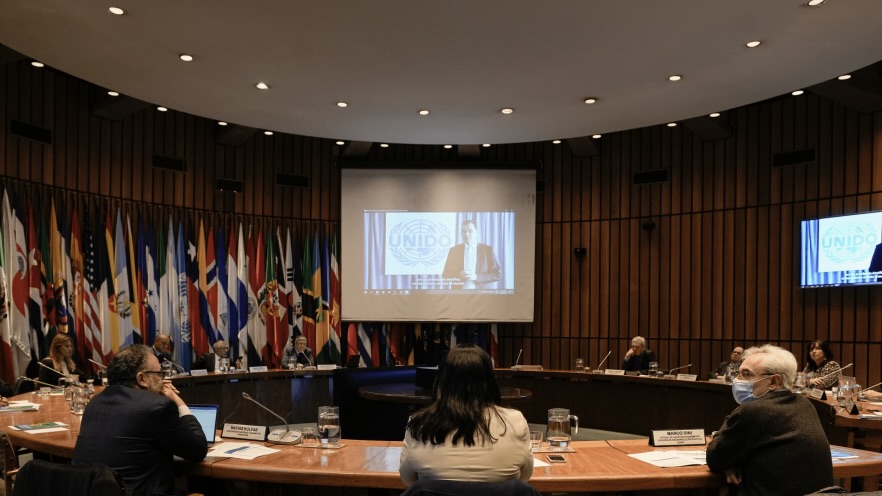Presentation of 2022 UNIDO Industrial Development Report provides platform to discuss the future of industrial policies in Latin America and the Caribbean
22 August 2022

SANTIAGO, 22 August 2022 – The United Nations Industrial Development Organization (UNIDO) presented its Industrial Development Report (IDR) 2022: The future of industrialization in a post-pandemic world during the “The future of Latin America industrialization in the face of new global challenges” seminar, which was co-organized with the United Nations Economic Commission for Latin America and the Caribbean (ECLAC).
“All nations must work closely together to build a better and more resilient future”, said UNIDO Director General Gerd Müller during his pre-recorded opening statement. “We must strive for an industrial development that is inclusive and sustainable to address the challenges that Latin American countries face – including climate change and global inflation – while they recover from the COVID-I9 pandemic”.
The Seminar provided a framework for academia, policymakers, and private sector representatives from several countries of the region to discuss future industrial policies.
“Industrial policy and industrial development are fundamental not only to increase production and productivity, but also to distribute incomes through an endogenous model that creates jobs, capacities and skills”, said Mario Cimoli, ECLAC Acting Executive Secretary. “The report and the partnership between UNIDO and ECLAC are decisive to enhance a better understanding of the role of industrial policies in Latin America”.
In his presentation of the main findings of the report, Alejandro Lavopa, UNIDO Coordinator of the IDR production process, highlighted three megatrends identified in the report which are re-shaping the process of industrial development, and which need to be accounted for in the design of future industrial policies in the region: digitalization and automation, global production rebalancing, and industrial greening.
“The new industrial policy must focus on two major aspects: the green and the digital transition”, said Manuel Albaladejo, UNIDO Representative of UNIDO for Uruguay, Argentina, Chile, and Paraguay.
The IDR main findings were widely supported by the participants, with small and medium-sized enterprises (SMEs) being a main focus of the ensuing discussion as they were the segment most hardly hit during the COVID-19 crisis.
“Digital technologies will change the international division of labour, but Latin America will not be able to benefit from this reorganization of global value chains unless it spurs industrial digitalization”, said Luciano Coutinho, Professor at the University of Campinas and former President of the Brazilian Development Bank (BNDES). “Since SMEs are lagging behind in the uptake of digital technologies, I call for urgent, SME-specific policies”.
Thereafter, Carmen Sánchez, President of Uruguay’s National Development Agency (ANDE), provided a summary of the policies and initiatives implemented in that country to support the recovery of industrial SMEs.
“Digital transformation is one of the strategic lines of the Agency”, said Carmen Sánchez. “This need was present before, but the pandemic has accelerated it”.
In terms of industrial greening – the third megatrend highlighted in the report – opinions expressed also support the IDR findings.
“A green transition without industrial policy would not only cause the region to lose socioeconomic development opportunities”, said Matias Kulfas, Professor at the National University of San Martin and former Argentinian Minister of Productive Development. “This could also generate additional macroeconomic problems in terms of imports and financial requirements”.
“Chile needs to strengthen the state capacity to be able to keep transformations that will require several years to address the climate change emergency”, said Javiera Petersen, Undersecretary of Economy from Chile. “We will need a better coordination across ministries and government agencies, and new instruments to finance development including the creation of a national development bank”.
The event also benefitted from the insights of other experts and policy makers of the region who discussed specific challenges ahead in terms of future industrial policy design and implementation.
“The region has learnt important lessons on these topics and many countries have interesting initiatives to showcase”, said Mario Castillo, ECLAC Director of Productive and Business Development during his closing remarks. “The region needs to strengthen its capacity to anticipate future challenges and today’s seminar could help strengthening such capacity”.
The full recording of the event is available here.
The UNIDO Industrial Development Report series is an established source of reference on industrial development; the IDR 2022 is available here.
For more information, please contact:
Alejandro Lavopa
UNIDO Research and Industrial Policy Officer